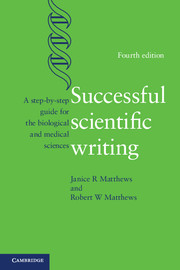Book contents
- Frontmatter
- Contents
- Preface to the fourth edition
- 1 Start with a plan
- 2 Conduct a comprehensive literature search
- 3 Prepare for the challenge
- 4 Begin well
- 5 Compose the IMRAD core of a strong first draft
- 6 Assemble the rest of the first draft
- 7 Compile tables to develop, clarify, and support your story
- 8 Include figures for evidence, efficiency, or emphasis
- 9 Report numbers clearly and responsibly
- 10 Revise for coherence
- 11 Improve style and syntax
- 12 Improve word choice
- 13 Attend to punctuation, capitalization, and other mechanics
- 14 Address your ethical and legal responsibilities
- 15 Oral presentations: adapt the text and visuals
- 16 Share your story in public: presenting talks and posters
- 17 Publication: the rest of the story
- Thirty exercises to improve anyone’s scientific writing skills
- Selected resources
- Index
3 - Prepare for the challenge
Published online by Cambridge University Press: 05 November 2014
- Frontmatter
- Contents
- Preface to the fourth edition
- 1 Start with a plan
- 2 Conduct a comprehensive literature search
- 3 Prepare for the challenge
- 4 Begin well
- 5 Compose the IMRAD core of a strong first draft
- 6 Assemble the rest of the first draft
- 7 Compile tables to develop, clarify, and support your story
- 8 Include figures for evidence, efficiency, or emphasis
- 9 Report numbers clearly and responsibly
- 10 Revise for coherence
- 11 Improve style and syntax
- 12 Improve word choice
- 13 Attend to punctuation, capitalization, and other mechanics
- 14 Address your ethical and legal responsibilities
- 15 Oral presentations: adapt the text and visuals
- 16 Share your story in public: presenting talks and posters
- 17 Publication: the rest of the story
- Thirty exercises to improve anyone’s scientific writing skills
- Selected resources
- Index
Summary
Failing to plan is planning to fail.
aphorismAt this point, you have amassed quite a pile of research information – both your own, and that which you’ve gathered from your literature search. Gathering it probably has taken longer than you thought it would. Are you tempted to just grab something from the pile and start writing? Don’t. To do so would be akin to leaving on a trip to unknown parts without a road map! Instead, take control of the journey with a bit of planning, combined with an approach that works with and around your natural inclinations and keeps the momentum going.
Take charge of the task
“How do you eat an elephant?”
“One bite at a time!”
time-worn riddleHas this ever happened to you? Under pressure of a deadline, you must write a paper, but you just can’t quite get started and aren’t sure quite where to begin anyway. Days pass, and your guilt increases. Finally, a couple of days before the deadline, your adrenaline kicks in … you throw words together in whatever way you can, writing into the wee hours of the morning, then print a copy and hurriedly send it off or turn it in. Not your best effort, you mutter, but considering how little time you had, not too bad, either!
This is an old, sad story. We all have fooled ourselves like this at times. We know in the back of our minds that time spent on revision would have improved that hastily written paper immensely. But … it might take more work, and we’re not even quite sure where to begin. What if fiddling around just made the paper worse? What if we ran out of time halfway through? What if? Maybe it would be easier to keep on making excuses.
- Type
- Chapter
- Information
- Successful Scientific WritingA Step-by-Step Guide for the Biological and Medical Sciences, pp. 28 - 40Publisher: Cambridge University PressPrint publication year: 2014



